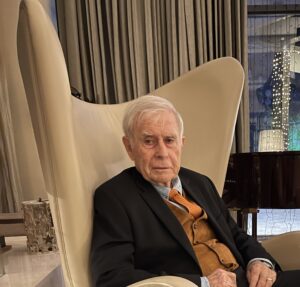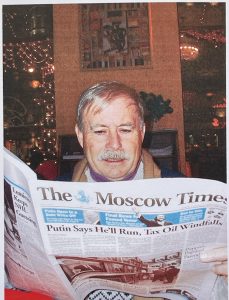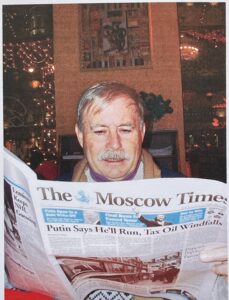
Congress and President Biden have decided to save America from the disclosure of state secrets by the Kardashian wannabees of our society. Peg and I do not do TikTok but occasionally some marginally functioning teenager will create a TikTok post that is so lacking in taste and talent that the main stream media airs it as a parody. Those are the only TikToks I have seen; that’s plenty.
Physically unattractive people gyrating to two-beat music while wearing too small bikinis is not my choice of leisure listening and viewing. Fortunately, the shameless exhibitionists who are totally lacking in true self-images almost never say anything. So, at least, we only are assaulted by their physical repugnance.
Why we are paying our leaders to spend countless hours on the foibles of misguided or unguided youths while Congress is profligately spending 100 billion dollars per year arming every country from Ukraine to Israel is a mystery to me. Perhaps they should concentrate on such issues as war and the environment or even why our banks are failing and why inflation is wreaking havoc on our 401(k)s. Regardless, the CEO of TikTok, Shou Zi Chew, is going before Congress’ House Energy and Commerce Committee this month to explain the First Amendment to people who should already know it.
When our Constitution was adopted the very First Amendment provided:
“Congress shall make no law respecting an establishment of religion, or prohibit the free exercise thereof, or abridging the freedom of speech, or of the press; or the right of the people peaceably to assemble, and to petition the government for a redress of grievances.”
The great English legal philosopher, John Locke (1632-1704), helped lead the Enlightenment. The American legal philosopher, James Madison (1751-1836), owed so much to Locke in Madison’s drafting of our Constitution, particularly the Bill of Rights. Both Locke and Madison strongly believed Freedom of Speech was essential to preserving all other freedoms.
It is ironic that our leaders of today cite fear of Russia and China as they call for restrictions on free speech. We have long rightfully complained that China and Russia severely restrict their citizens’ right to freely express themselves. Now we want to make federal law based on that same fear of American citizens that the Chinese and Russians enforce as to such patriots as Alexei Navalny. At least, Navalny actually has something to say that Putin should fear, that is the truth. TikTokers pretty much simply wish to share their irrelevant and boorish behaviors.
My guess is our leaders are as clueless about the workings of TikTok as I am and that they are simply knee-jerking to baseless fears of the very people who put them in office. What about such public policy as the 1966 Freedom of Information Act that was enacted to guarantee the people could monitor their government? Then there is the 2014 Digital Accountability and Transparency Act that allows taxpayers to track government spending. Have our current leaders decided too much information in the hands of Americans is dangerous, at least if that information can be accessed by foreign governments, as they can easily do with a simple request for data?
Of course, Congress and the President say they fear China and Russia and other countries will mine the internet data and use it against us. But every credit card transaction, every online post such as filing a tax return, every cell phone use is already “mineable.” Any hostile foreign country can already legally obtain more information than they would ever need via our own legal system. I ask you, Gentle Reader, is there anything on TikTok that could be used to start a lawnmower much less build a nuclear weapon?
I would like for our leaders to revisit Joseph Goebbels who was evil but prescient when he said, “If you repeat a lie often enough, people will believe it, and you will even come to believe it yourself.” In other words, our government is making its own reality and using that as the basis to restrict our rights under the First Amendment.
Another author that should be considered is Franz Kafka whose hero, Joseph K in The Trial, pointed out that the enacted laws made it impossible for anyone to rely on what the law truly is. This is much like George Orwell’s “Newspeak” in 1984 where the only true purpose of governmental language was to control the populace.
In other words, instead of taking Vladimir Putin and Xi Jinping as our free speech guides, perhaps we should look to our Constitution and our history and rationally analyze TikTok and its mainly pathetic users. I point out that just last year (2022) the European Union, which we look upon favorably, passed the Data Act (Digital Accountability and Transparency Act) that was designed to standardize international contracting and commerce by standardizing digital and internet language. Should we not also want to clarify by expanding instead of restricting internet usage even if the usage may be frivolous?
I call upon Congress and the President to not put the means as Kafka might say, “to exercise discretionary moral judgment” by the lone U.S. Secretary of Commerce to determine “freedom of speech” when it comes to foreign technologies and companies. That is how the proposed anti-TikTok law is structured. Instead, let’s have faith in ourselves and also recognize the banality and futility of trying to draft laws that defy human nature and common sense and by the way, are most likely unconstitutional and unenforceable.







